

What Work Is Really For. The Stone is a forum for contemporary philosophers and other thinkers on issues both timely and timeless.
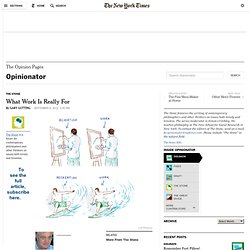
Is work good or bad? A fatuous question, it may seem, with unemployment such a pressing national concern. (Apart from the names of the two candidates, “jobs” was the politically relevant word most used by speakers at the Republican and Democratic conventions.) Even apart from current worries, the goodness of work is deep in our culture. We applaud people for their work ethic, judge our economy by its productivity and even honor work with a national holiday. But there’s an underlying ambivalence: we celebrate Labor Day by not working, the Book of Genesis says work is punishment for Adam’s sin, and many of us count the days to the next vacation and see a contented retirement as the only reason for working.
We’re ambivalent about work because in our capitalist system it means work-for-pay (wage-labor), not for its own sake. Everything depends on how we understand leisure. Www.stthomas.edu/cathstudies/cst/curriculum/PortlandCurr/NaughTeachNoteCh1Lei.pdf. Www.mmisi.org/ma/42_04/austenfeld.pdf. Christianity and the Pursuit of Leisure (Seattle Catholic) Liz Coleman's call to reinvent liberal arts education. The Life and Works of Josef Pieper Documentary. Leisure and Its Threefold Opposition. Leisure and Its Threefold Opposition | Josef Pieper | From Josef Pieper: An Anthology Print-friendly version Whoever advocates leisure nowadays may already be on the defensive.
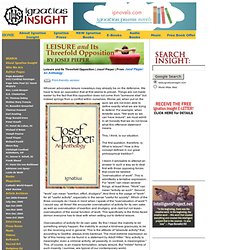
We have to face an opposition that at first seems to prevail. Things are not made easier by the fact that this opposition does not come from "someone else" but indeed springs from a conflict within ourselves. Worse yet, when put on the spot, we are not even able to define exactly what we are trying to defend. This, I think, is our situation. The first question, therefore, is: What is leisure? Leisure, the Sacred Gesture, and Human Dignity: Thorstein Veblen and Josef Pieper’s Understandings of Leisure. Thorstein Veblen’s The Theory of the Leisure Class sets out very specific definitions of words that we think we understand, use on a regular basis, and for which believe we know the definitions.
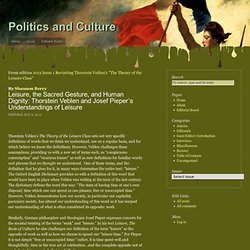
However, Veblen challenges these assumptions, providing us with a new set of terms such, as “conspicuous consumption” and “vicarious leisure” as well as new definitions for familiar words and phrases that we thought we understood. One of these terms, and the definition that he gives for it, in many ways determines the entire text: “leisure.” The Oxford English Dictionary provides us with a definition of this word that would have been in place when Veblen was writing at the turn of the last century. The Foreword to Josef Pieper's "Leisure: The Basis of Culture" The Roots of Culture | The Foreword to Josef Pieper's Leisure: The Basis of Culture | Fr.
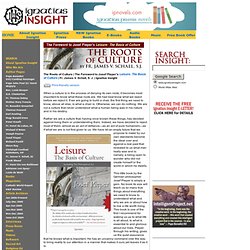
James V. Schall, S. J. | Ignatius Insight Print-friendly version When a culture is in the process of denying its own roots, it becomes most important to know what these roots are. Rather we are a culture that, having once known these things, has decided against living them or understanding them. Propose to make by our own standards become the ideal over and against a real past that revealed to us what man really was and is: namely, a being open to wonder who did not create himself or the world in which he dwells. This little book by the German philosopher Josef Pieper is simply a gem.
This book contains two related essays that Pieper gave in Bonn in 1946. Both essays belong together. Originally, these essays were written with the background of World War II and its aftermath. At first sight, it seems that something, almost anything, must be done about our situation. James V. When You Can't Sleep, How Good Is Lying in Bed With Your Eyes Closed? - Brian Fung. The key differences between sleep and "quiet wakefulness" Fake-sleeping kitten, only fooling herself.

(yoppy/Flickr) Reddit is a great forum for raising scientific questions, but the fact that it's discussion-based makes it difficult to know when a debate has settled on the best answer, objectively speaking. Exhibit A concerns the value of lying down with your eyes closed. What Work Is Really For. The Stone is a forum for contemporary philosophers and other thinkers on issues both timely and timeless.
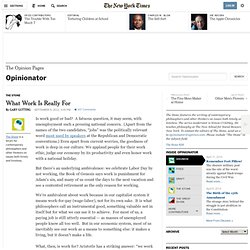
Is work good or bad? A fatuous question, it may seem, with unemployment such a pressing national concern. (Apart from the names of the two candidates, “jobs” was the politically relevant word most used by speakers at the Republican and Democratic conventions.) Even apart from current worries, the goodness of work is deep in our culture. The 'Busy' Trap. Anxiety: We worry.

A gallery of contributors count the ways. If you live in America in the 21st century you’ve probably had to listen to a lot of people tell you how busy they are. It’s become the default response when you ask anyone how they’re doing: “Busy!” “So busy.” “Crazy busy.” It’s not as if any of us wants to live like this; it’s something we collectively force one another to do. Notice it isn’t generally people pulling back-to-back shifts in the I.C.U. or commuting by bus to three minimum-wage jobs who tell you how busy they are; what those people are is not busy but tired. Brecht Vandenbroucke Even children are busy now, scheduled down to the half-hour with classes and extracurricular activities.
Josef Pieper: Sisyphus and the Defense of Leisure. Alasdair MacIntyre: On Having Survived Academic Moral Philosophy (1 of 4)